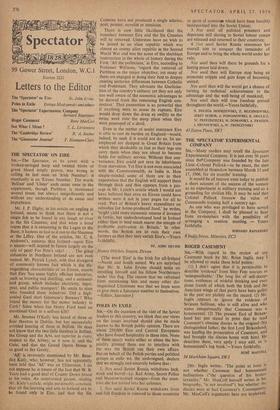Letters to the Editor
The 'Spectator' on Eire St. John Ervin, Poles in Exile Dolega Modrzewsk, and otheri
The 'Spectator' Experimental Company
Bernard Raperport
Roger Casement Rene MacColl See What 1 Mean ? T. L. Littlewooa The `Cambridge Review' R. 4. Becher The 'Gloucester Journal' T. Hannam-Clark
THE 'SPECTATOR' ON EIRE
SIR,—The Spectator, as its cover with a broken-stringed harp and twisted blobs of green blood amply proves, was wrong in calling its last issue an 'Irish Number': it manifestly is an 'Eirean Number.' The words 'Belfast' and 'Ulster' each occur once in the supplement, though Partition is mentioned several times, but always insignificantly and without any understanding of its cause and importance.
Mr. J. P. Digby, in his article on angling in Ireland, seems to think that there is not a single fish to be found in any lough or Aver in the Six Counties; and that when a trout learns that it is swimming in the Lagan or the Bann, it hastens as fast as it can to the Shannon or the Liffey. One of the articles, Mr. C. S. Andrews's, assumes that Ireland—again Eire is meant—will depend in future largely on the sale of peat! For Pete's sake! . . . The great industries in Northern Ireland are not even named. Mr. Patrick Lynch, with that disregard of commonly known fact which is the dis- tinguishing characteristic of an Eirean, asserts that Eire 'has some highly efficient industries, such as brewing and distilling, and a national- ised group, which includes electricity, sugar, peat, and public transport.' He omits to state who founded these industries. Did a high- souled Gacl start Guinness's Brewery? Who found the money for the motor industry in Cork? Since when has Henry Ford been an emotional'Gael in a saffron kilt?
Mr. Seumas O'Kelly has heard of three or four theatres in Dublin, but has successfully avoided hearing of three in Belfast. He does not know that the two little theatres in Belfast, the Group and the Arts, are superior in every respect to the. Abbey, as it now is, and the Gate; and that the Grand Opera House is as good as the Gaiety.
'AE' is reverently mentioned by Mr. Bene- dict Kiely, ,who, however, has not apparently been told that 'AE' was an Ulsterman. I do not suppose he is aware of the fact that W. B. Yeats had a good deal of County Down blood in his veins. An uninformed person, reading Mr. Kicly's article, might pardonably conclude that all the learning and arts in Ireland are to be found only in Eire, and that the Six Counties have not produced a single scholar, poet, painter, novelist or musician.
There is now little likelihood that the boundary between Eire and the Six Counties will be removed. Ulstermen have no wish to be joined to an alien republic which was almost an enemy alien republic in the Second World War and was the scene of the shabbiest insurrection in the whole of history during the First. 'All the politicians,' in Eire, according to Professor Williams, 'regard the removal of Partition as the major objective; yet many of them are engaged in doing their best to deepen existing sectarian differences between Catholic and Protestant. They advocate the Gaclicisa- tion of the country's culture; yet they are only too well aware of the economic advantages to be derived from the remaining English con- nection.' That connection is so powerful that if anything were to cause its rupture, Eirc would drop down the drain as swiftly as the swine went over the steep place when they were possessed of a devil.
Even in the matter of social insurance Eirc is able to cast its burden on England—would, indeed, be sunk if it could not do so. Its un- employed are dumped in Great Britain from which they skedaddle as fast as their legs can carry them when they are about to become liable for military service. Without that con- venience, Eirc could not save its inhabitants from starvation. Yet Eirc is not even associated with the Commonwealth, as India is. How simple-minded some of them are in their expectation that the English will support them through thick and thin appears from a pas- sage in Mr. Lynch's article which I would not have believed that even an Eirean could have written were it not in your pages for all to read. 'Part of Britain's heavy expenditure on subsidies for home-produced food,' he writes, 'might yield more economic returns if invested in fertile, but underdeveloped land in Ireland rather than in land much nearer the margin of profitable cultivation in Britain.' In other words, the British arc to ruin their own farmers so that they may enrich Eire's.—Yours faithfully,
ST. JOHN ERVINE Honey Ditches, Seaton, Devon
[The word 'Eire' is the Irish for all-Ireland —North and South united. We are surprised that Mr. St. John Ervinc should insist on enrolling himself and his fellow Northerners under this flag. The reason that we refrained from mentioning him and many other dis- tinguished Ulstermen was that we hope soon to give them a Spectator number to themselves. —Editor, Spectator.]










































 Previous page
Previous page